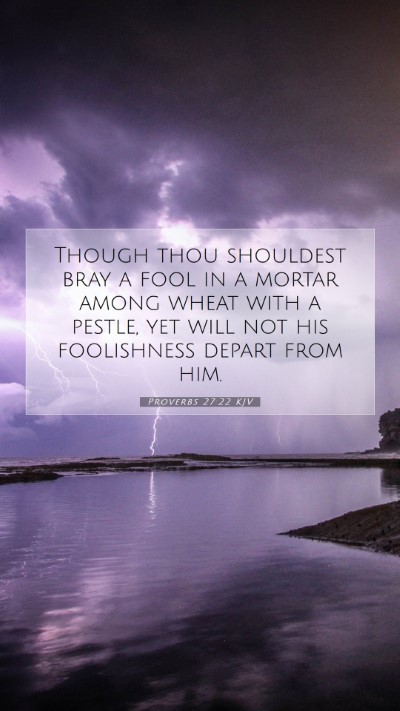Understanding Proverbs 27:22
This segment provides a comprehensive exploration of the Bible verse Proverbs 27:22, integrating insights from esteemed public domain commentaries such as those by Matthew Henry, Albert Barnes, and Adam Clarke. This examination emphasizes various aspects of the verse that can enhance your Bible verse understanding and Bible study insights.
Verse Context
Proverbs 27:22 states, “Though you grind a fool in a mortar, with a pestle along with crushed grain, yet will not his foolishness depart from him.” This verse serves as a colorful metaphor illustrating the permanence of foolishness in certain individuals.
Interpretation and Meaning
The meaning of this verse can be summarized through the following key insights:
-
Permanence of Foolishness:
According to Matthew Henry, the verse conveys a powerful message about the nature of folly, indicating that some people are so entrenched in their foolish ways that no amount of external pressure or correction can change them.
-
Metaphorical Imagery:
Albert Barnes notes that the imagery of grinding grain symbolizes rigorous, intensive efforts to produce change, which highlights the futility of attempting to reform a "fool." Just as grain remains unchanged despite the grinding, so does the foolish individual remain unaffected.
-
Nature of Wisdom vs. Folly:
According to Adam Clarke, the distinction between wisdom and folly is emphasized, suggesting that while wise individuals can learn and adapt, fools are resistant to change, illustrating the limitations of external influence on character development.
Practical Applications
Understanding this scripture can help in the following ways:
-
Self-Reflection:
This verse encourages individuals to assess their own actions and attitudes in light of its teachings, prompting self-examination of personal foolishness that may need to be addressed.
-
Interaction with Others:
In dealing with others, particularly those who exhibit foolish behaviors, this verse provides guidance on the limitations of counsel and corrections one may offer.
-
Discerning Relationships:
It encourages caution in forging relationships with individuals who consistently demonstrate foolishness, prompting a more discerning approach to social interactions.
Cross References
Here are some additional Bible cross references that relate closely to Proverbs 27:22:
- Proverbs 1:7: “The fear of the Lord is the beginning of knowledge: but fools despise wisdom and instruction.”
- Proverbs 14:7: “Go from the presence of a foolish man, when thou perceivest not in him the lips of knowledge.”
- Proverbs 26:11: “As a dog returneth to his vomit, so a fool returneth to his folly.”
Conclusion
In conclusion, Proverbs 27:22 imparts significant insights into the nature of foolishness and the often unavoidable reality of its persistence. Understanding scripture through such Bible verse commentary helps us navigate our lives in wisdom, encouraging a keen awareness of both our character and the characters of those around us.
Further Study Suggestions
For those interested in diving deeper into Bible study resources, consider exploring the following:
- Bible Study Guides: Utilize guides that focus on the Book of Proverbs for more insights.
- Online Bible Study: Join online groups that discuss wisdom literature for diverse perspectives.
- Bible Study Lessons: Look for lessons specifically addressing the themes of folly and wisdom in Proverbs.


